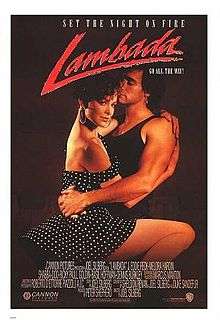
Distar UFM-13 Lambada
The Distar UFM-13 Lambada (named for the Brazilian dance) is a Czech shoulder-wing, two-seat motor glider originally designed and produced by Urban Air and now built by Distar Air of Ústí nad Orlicí.
Design and development
The Lambada was designed to comply with the Fédération Aéronautique Internationale microlight rules at a gross weight of 472.5 kg (1,042 lb) and US light-sport aircraft rules at 600 kg (1,323 lb). The design is on the Federal Aviation Administration's list of approved special light-sport aircraft.
The aircraft features a cantilever wing, a T-tail, a two-seats-in-side-by-side configuration enclosed cockpit under a bubble canopy, fixed tricycle landing gear or conventional landing gear with a steerable tail wheel and a single engine in tractor configuration.
The aircraft is made from composites. Its 13 m (42.7 ft) span wing employs a SM 701 airfoil, has an area of 12.16 m2 (130.9 sq ft) and flaperons with spoilers or optionally ailerons and dive brakes. Flaperon settings are 0°, 5°, 9° and 16°, with the last setting assisted by the spoilers. The wings can be extended to 15 m (49.2 ft) with wing tips for soaring. The main landing gear legs are fabricated from fibreglass laminates and the wheels are equipped with single lever hydraulic brakes. Standard engines available are the 80 hp (60 kW) Rotax 912UL and the 85 hp (63 kW) Jabiru 2200 four-stroke powerplants.

Lambada
Lambada (![]() pronunciation ) is a dance from Pará, Brazil. Lambada is an Afro-Brazilian dance authentic to people of Black/African descent who brought much of their music and dance culture with them into Brazil upon arrival into the country during the Transatlantic Slave Trade. The Afro-Brazilian dance became internationally popular in the 1980s, especially in Latin America and Caribbean countries. It has adopted aspects of dances such as forró, salsa, merengue, maxixe and the carimbó.
pronunciation ) is a dance from Pará, Brazil. Lambada is an Afro-Brazilian dance authentic to people of Black/African descent who brought much of their music and dance culture with them into Brazil upon arrival into the country during the Transatlantic Slave Trade. The Afro-Brazilian dance became internationally popular in the 1980s, especially in Latin America and Caribbean countries. It has adopted aspects of dances such as forró, salsa, merengue, maxixe and the carimbó.
Lambada is generally a partner dance. The dancers generally dance with arched legs, with the steps being from side to side, turning or even swaying, and in its original form never front to back, with a pronounced movement of the hips. At the time when the dance became popular, short skirts for women were in fashion and men wore long trousers, and the dance has become associated with such clothing, especially for women wearing short skirts that swirl up when the woman spins around, typically revealing 90s-style thong underwear.

Lambada (film)
Lambada is a 1990 dramatic film starring J. Eddie Peck, Melora Hardin, Adolfo "Shabba-doo" Quinones, Ricky Paull Goldin, Dennis Burkley, and Keene Curtis. Lambada was written and directed by Joel Silberg and choreographed by Shabba-Doo.
The film was released simultaneously with rival film The Forbidden Dance; neither was well received, though Lambada was called "the better of the two".
Plot
A Beverly Hills school teacher by day, Kevin Laird (J. Eddie Peck), journeys at night to a warehouse in East L.A, where a group of barrio kids gather to dance the lambada.
Using his dazzling dance moves to earn the kids' respect and acceptance, Kevin then teaches them academics in an informal backroom study hall. One of his students, Sandy (Melora Hardin) sees him at the club. The next morning at school while Kevin is teaching, Sandy daydreams that she and Kevin are dancing and he madly kisses her on his motorcycle. It's the best of both worlds, but then Sandy becomes a jealous and lovestruck student and she exposes Kevin's double life, his two worlds collide, threatening his job and reputation.
Lambada (Brazilian film)
Lambada a.k.a. Rhythm and Passion is a co-production between Brazil and Italy in 1990.
Synopsis
Michael (Andrew J. Forest) is a young, handsome video director from the United States, in Brazil to shoot a video for the beautiful rock singer Annabelle Lewis (Mary Sellers).
Michael will fall in love with the very sexy Regina (Via Negromonte) sees on the streets and spotted again at a seedy, underground club where the lambada electrifies and ignities the audience.
Annabelle will come infatuated with Temistocles (Carlinhos de Jesus), a gambler, a ruthless killer, as well as an expert Lambada dancer.
Cast
Crew
Distar
Distar may refer to:
Karmarts
Karmarts, formerly known as DiStar Electric Corporation, is an importer and distributor of multi bands cosmetic goods and beauty products. The company once was a manufacturer and distributor of electronic goods under the brand DiStar.
History
The company was established as DiStar Electric Corporation on 11 May 1982 and registered as a public company on 18 March 1994. The company was listed on the Stock Exchange of Thailand on 31 October 1994.
DISTAR
DISTAR is an acronym for Direct Instruction System for Teaching Arithmetic and Reading, a trademarked program of SRA/McGraw-Hill, a commercial publishing company. The program is used particularly for historically disadvantaged and/or at-risk students. DISTAR Reading has been extensively expanded and rebranded by SRA/McGraw-Hill as Reading Mastery while DISTAR Arithmetic I and II are still available (DISTAR Arithmetic III is out of print). DISTAR Language I and II have been updated and renamed Language for Learning and Language for Thinking. Direct instruction is one of several highly structured methodologies for teaching elementary, middle and high school students. Siegfried Engelmann, a professor at the University of Oregon, created the Direct Instruction model.
See also
External links
Podcasts:

